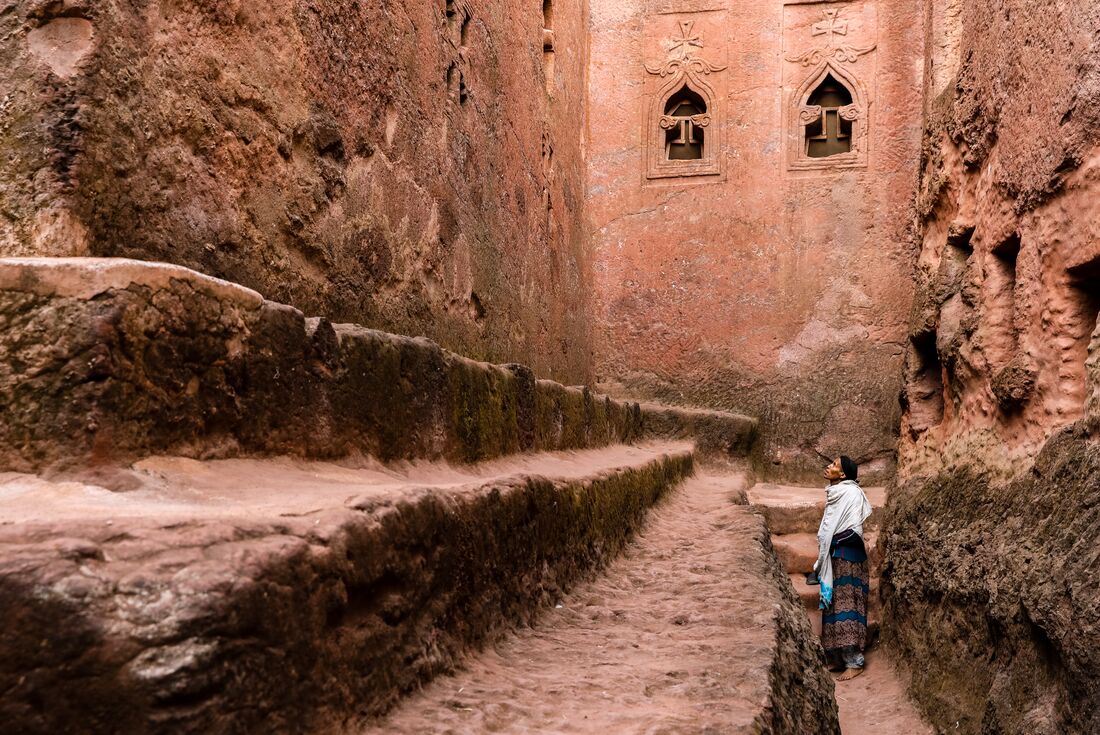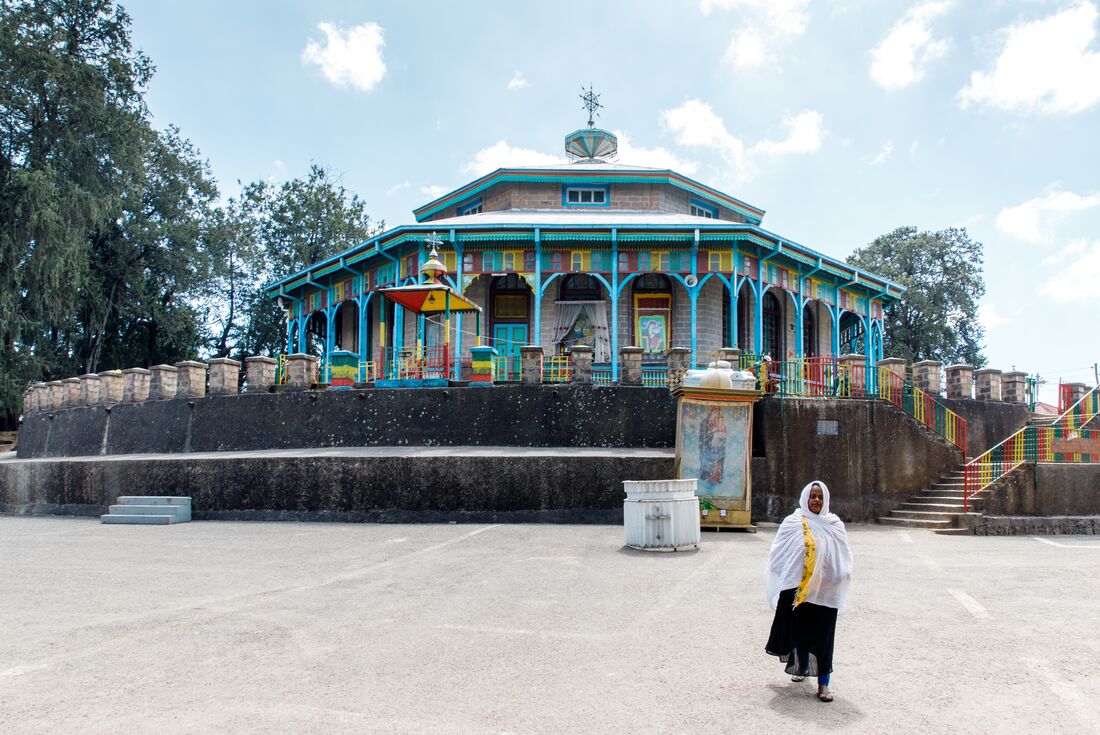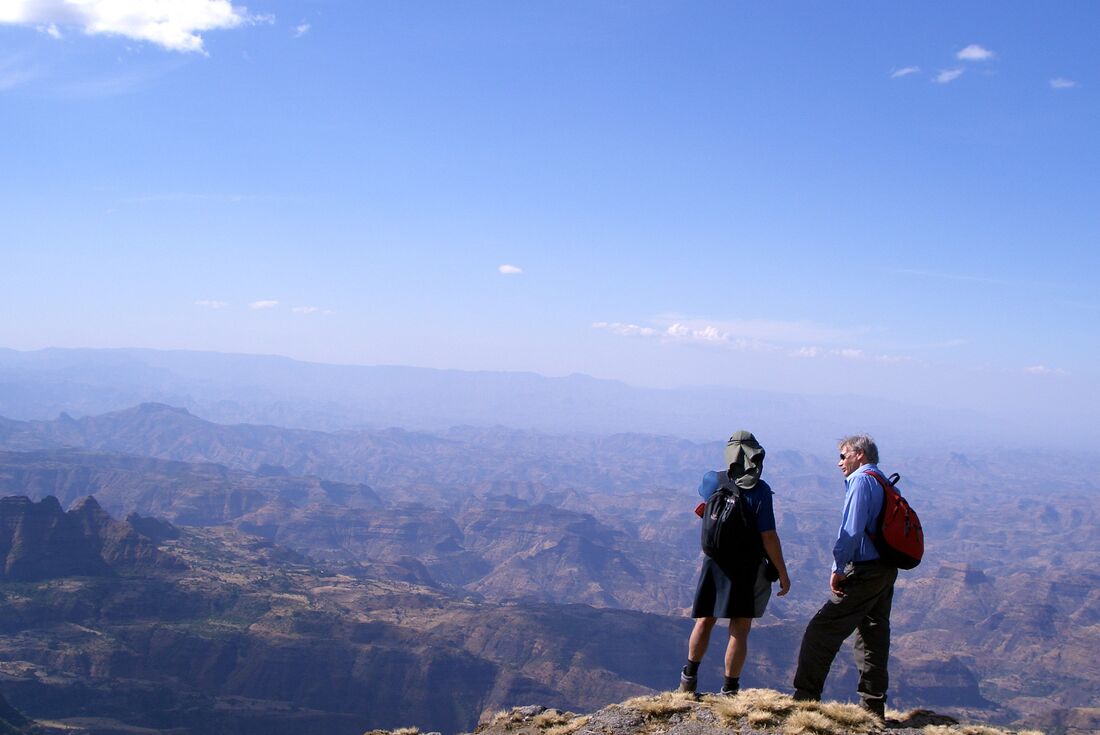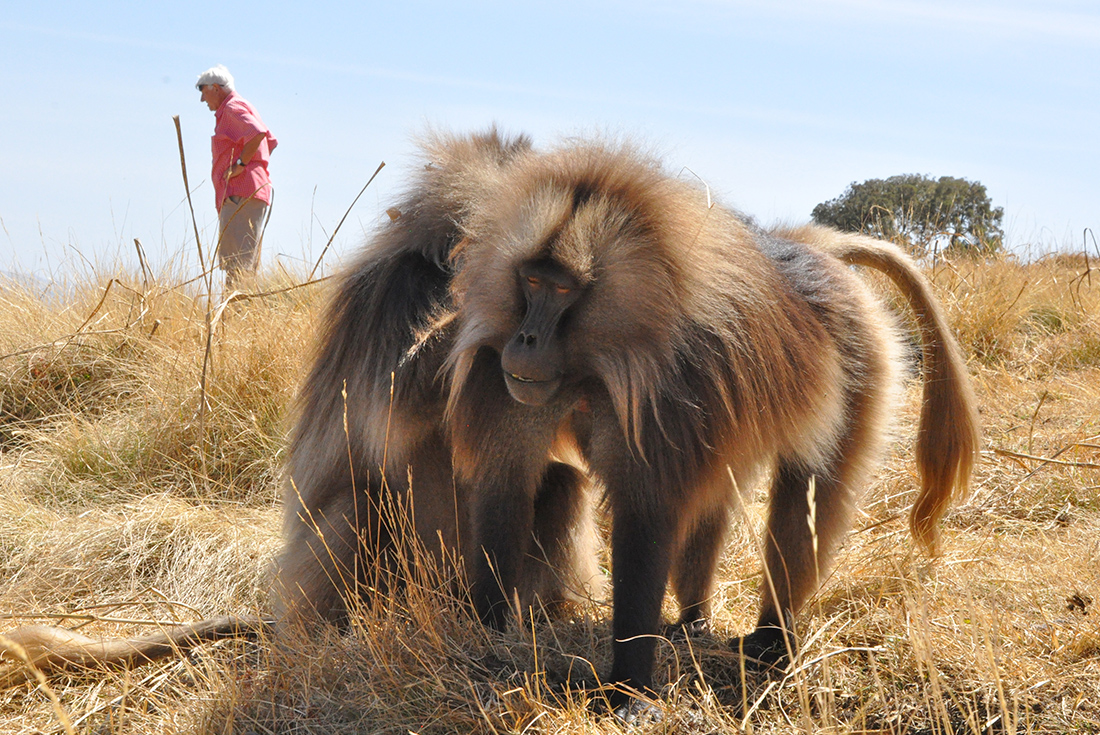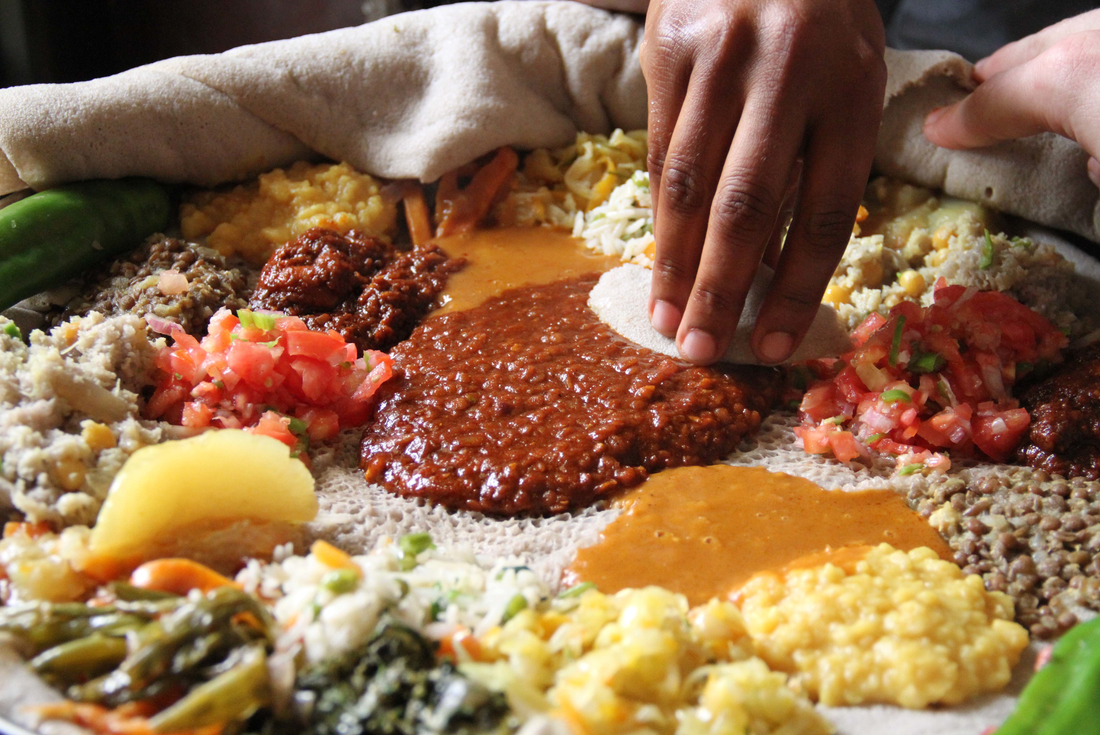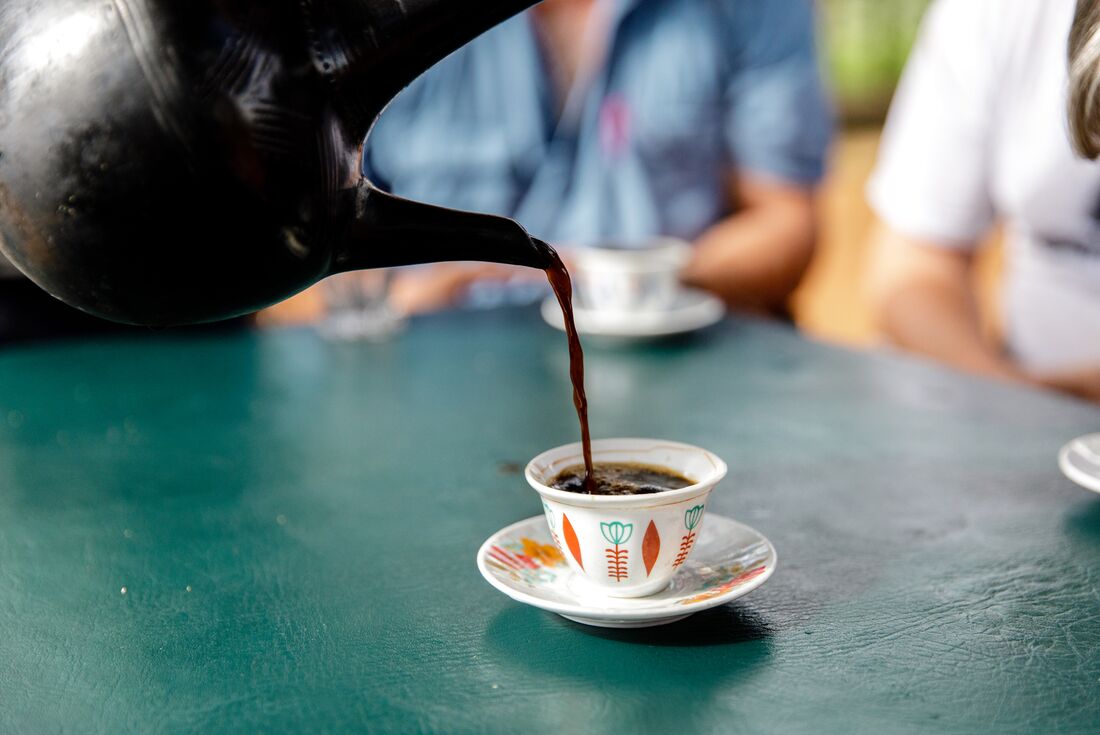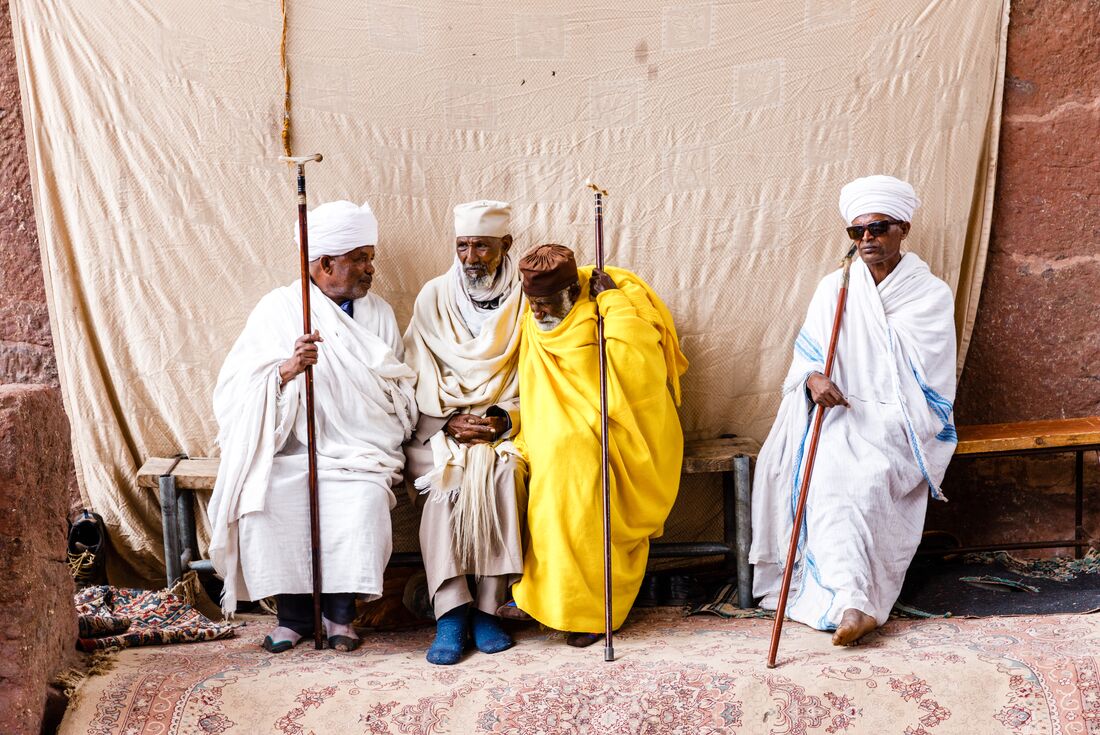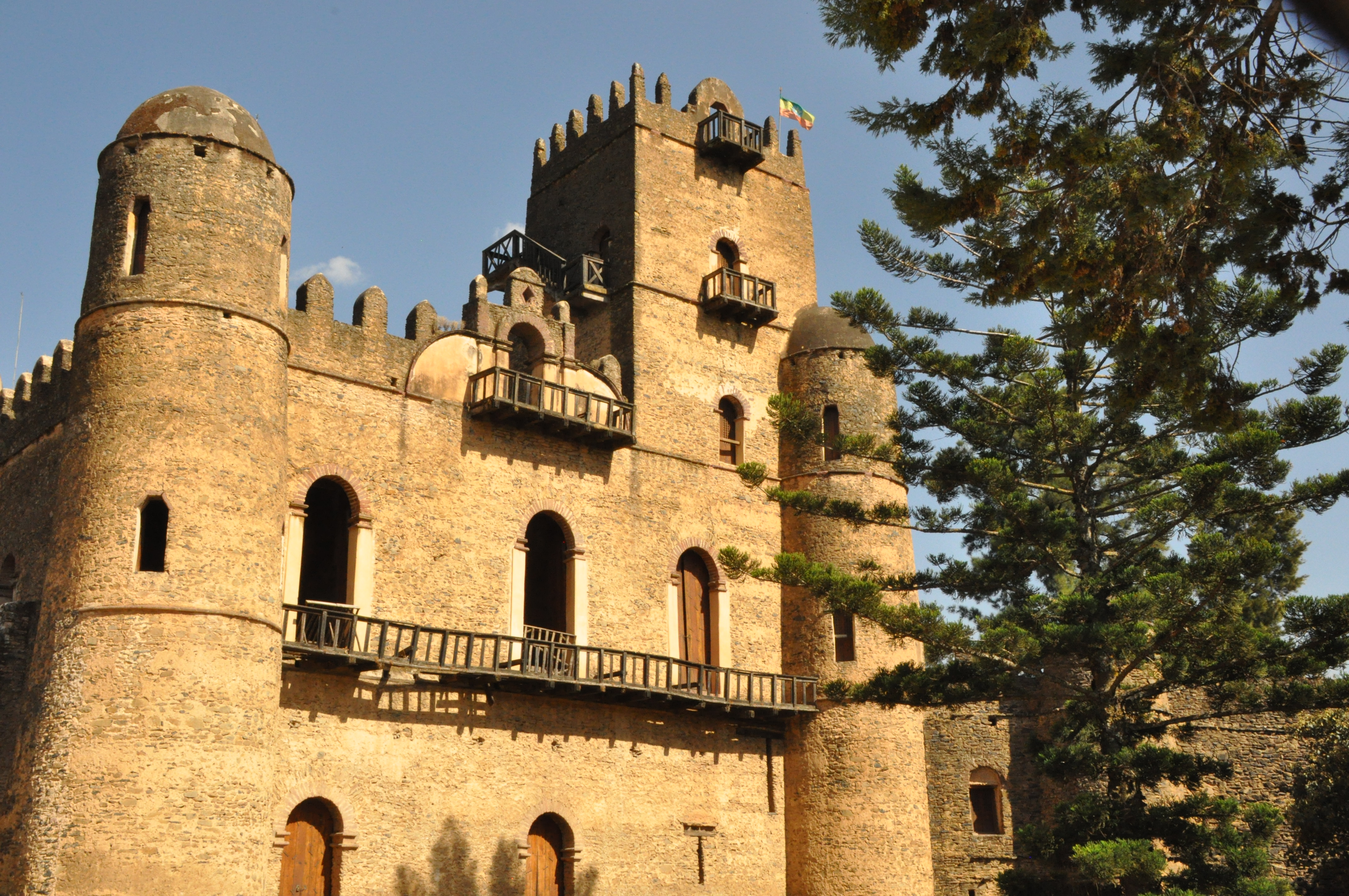- Search for the source of the Blue Nile on a boat cruise at Lake Tana, then discover the churches and unique castles of the regal city of Gondar.
- Trek the majestic series of undulating amethyst peaks that make up the Simien Mountains, looking out for the distinctive red-hearted gelada.
- After learning about its deep history, relax in the beautiful streets of Aksum and watch life go by, imagining when it was once at the centre of an important trade route that stretched from Egypt to the Mediterranean Sea
- Explore Lalibela's unique churches - astonishing constructions sculpted from huge slabs of stone - that make up one of the world's greatest historical and religious sites.
- Meet locals for a cooking class and traditional coffee ceremony
15 Jan 2024
Incredible Ethiopia
YOZE
Validity: 01 Jan 2020 to 31 Dec 2024
Travel to Ethiopia and discover a beautiful country, barely touched by modern society. It’s an incredible combination of history, tradition, culture and nature. From 3 million-year-old fossilised hominid remains in Addis Ababa to the amazing rock-hewn churches, hidden crypts and grottoes in Lalibela, this trip take you deep into human history. The 500-year-old monastery islands of Bahir Dar, the elegant castles of Gondar, the majestic geological formations of the Simien mountains, the giant obelisks that rise out of Axum, and even the rumoured home of the Ark of the Covenant. This 13 day trip travels through the north of the country, taking in views of the Blue Nile and trekking to the peaks of the Simien Mountains (meeting red-chested Gelada baboons). You’ll be sure to taste the country’s famous coffee and delectable cuisine, and meet the genuine and friendly people along the way. This is an adventure like no other.
Original
Explorer
Private vehicle,Boat,Plane
3
A intermediate level of fitness is required to be able to enjoy this trip to the fullest. There are included hikes at Simien Mountains National Park and Lalibela that go above 2800m/9000ft.
Golden Royal Hotel
Woreda 03, House number 2043 100m in front of Tele Medhane Alem towards UNHCR office
Bole
Addis Ababa
ETHIOPIA
Phone: +251 903182555
Transfers are available for pre-booking through Intrepid. Please speak to your booking agent for more information. If you have pre-booked an arrival transfer, please ensure you have provided Intrepid with your arrival flight details at least 15 days before the departure of your Intrepid trip. On arrival, please proceed outside the arrival terminal building to the entrance of the carpark and look for your transfer representative, likely standing in the shade, holding a board with your name. They will not be waiting inside the arrivals hall as there are strict government restrictions in place that prevent transfer drivers from waiting inside. If you cannot locate them, please call our local operator on +251 (911) 457 196. Alternatively complimentary shuttles are available through the Golden Royal Hotel (formally Sheger Royal Hotel) and are available by calling the hotel once you have landed on 0116392777. These are different to transfers pre-booked through Intrepid and will require waiting for multiple travellers across different arrival flights.
Harbe Hotel
Lalibela
Lalibela
ETHIOPIA
Phone: +251 333 360090
The Harbe Hotel is located 20 kilometres from the Lalibela International Airport. Private airport transfers are available for pre-booking through Intrepid. Contact your booking agent for details.
1. A single supplement is available if you’d prefer not to share a room on this trip. The single supplement applies to all nights of your trip and is subject to availability. Please speak to your booking agent for further information. 2. Parts of your trip go above 2800 metres / 9200 feet where it is common for travelers to experience some adverse health effects due to the altitude. 3. We recommend that you check your government's advice for their latest information on travelling in Ethiopia before your departure and ensure that your travel insurance covers you for all areas of your itinerary. We have links to prominent government travel advisories and regular updates on issues affecting this trip on our Travel Alerts page - https://www.intrepidtravel.com/travel-alerts.
Many national governments provide a regularly updated advice service on safety issues involved with international travel. We recommend that you check your government's advice for their latest travel information before departure and ensure that your travel insurance covers you for all areas your itinerary covers. Please refer to our website's safety page for links to major travel advisories and updates on safety issues affecting our trip. We strongly recommend the use of a neck wallet or money belt while travelling, for the safe-keeping of your passport, air tickets, cash and other valuable items. Leave your valuable jewellery at home - you won't need it while travelling. Many of our hotels have safety deposit boxes, which is the most secure way of storing your valuables. A lock is recommended for securing your luggage. Your group leader or local representative will accompany you on all included activities, however during your trip you'll have some free time to pursue your own interests, relax and take it easy or explore at your leisure. While your group leader or local representative will assist you with the available options in a given location, please note that any optional activities you undertake are not part of your Intrepid itinerary, and Intrepid makes no representations about the safety of the activity or the standard of the operators running them. Please use your own good judgement when selecting an activity in your free time. Please also note that your group leader or local representative has the authority to amend or cancel any part of the trip itinerary if it's deemed necessary due to safety concerns. For more details on the type of conditions and safety standards you can expect on your trip, please refer to Intrepid's operational safety policy on our website. We recommend that you take a moment to read through this information before travelling, and would appreciate any feedback on how well it's being implemented in the field: www.intrepidtravel.com/safety-guidelines
FIRE PRECAUTIONS Please be aware that local laws governing tourism facilities in this region differ from those in your home country and not all the accommodation which we use has a fire exit, fire extinguishers or smoke alarms. BALCONIES Some hotel balconies don't meet western standards in terms of the width of the balcony fence being narrower than 10cm. TRAFFIC AND DRIVING ON THE OTHER SIDE OF THE ROAD Depending on where you come from please note that drivers in this part of the world may drive on the opposite side of the road from what you are used to. Look both ways before crossing any road. Traffic can be a little more chaotic than you might be used to at home. Be aware! SEAT BELTS Please be aware that local laws governing transportation safety may differ from those in your home country and not all the transport which we use is able to provide seat belts. PICK POCKETING & PERSONAL SAFETY While travelling there is always the risk of pick-pocketing and petty theft, particularly in the more touristy cities. We recommend that you exercise caution when walking at night and encourage you to walk in groups and only on main, well-lit thoroughfares. Be particularly vigilant on public transport. Simple measures like carrying your day pack on your front, not hanging your bag over the back of your chair or on the floor and wearing a money belt will reduce any chance that your valuables should go missing. WATER SAFETY Please take care when taking part in any activities in the ocean, river or open water, where waves and currents can be unpredictable. It's expected that anyone taking part in water activities is able to swim and have experience in open water. All swimmers should seek local advice before entering the water. TRAVEL ADVICE & TRAVEL INSURANCE We recommend that you check your government's advice in relation to the areas you will be visiting for their latest travel information before departure and ensure that your travel insurance covers you for all areas your itinerary covers.
PASSPORT You’ll need a valid passport to travel internationally and most countries require your passport to have a minimum of 6 months validity, so remember to check the expiry date. We need your passport information to get everything ready for your trip so it’s important that the information on your booking matches your passport exactly. Please take care to provide the correct details. We recommend carrying a copy of the photo page of your passport while travelling and leaving a copy at home with family or friends. VISAS & ENTRY REQUIREMENTS Many countries require a visa and obtaining the correct visa for your trip and any countries you may transit through is your responsibility. We recommend you check your visa requirements as soon as you have booked your trip. This will ensure you have time to prepare your documents and for your visa application to be processed. You can check the entry requirements for your nationality on your government's foreign travel advisories, consular websites or on our page here: www.intrepidtravel.com/visa-entry-requirements
Search for the source of the Blue Nile on a boat cruise at Lake Tana, then discover the churches and unique castles of the regal city of Gondar.
Trek the majestic series of undulating amethyst peaks that make up the Simien Mountains, looking out for the distinctive red-hearted gelada.
After learning about its deep history, relax in the beautiful streets of Aksum and watch life go by, imagining when it was once at the centre of an important trade route that stretched from Egypt to the Mediterranean Sea
Explore Lalibela's unique churches - astonishing constructions sculpted from huge slabs of stone - that make up one of the world's greatest historical and religious sites.
Meet locals for a cooking class and traditional coffee ceremony
In Lalibela and Simien Mountains National Park we include day hikes to experience the beauty of the regions on foot. Parts of your trip go above 2800 metres / 9200 feet where it is common for travellers to experience some adverse health effects due to the altitude. There will be some long drives on days 7 & 10. Refer to Special Information within the itinerary to see if your chosen date is aligned with any festivals
GENERAL HEALTH All travellers need to be in good physical health in order to participate fully on this trip. For the safety and wellbeing of yourself and others, if you are unwell prior to travelling, please stay at home and contact us to make alternative arrangements. When selecting your trip please make sure you have read through the itinerary carefully and assess your ability to manage and enjoy our style of travel. Please note that if in the assessment of our group leader or local representative a traveller is unable to complete the itinerary without undue risk to themselves and/or the rest of the group, we reserve the right to exclude them from all or part of a trip without refund. You should consult your doctor for up-to-date medical travel information or for any necessary vaccinations before departure. We recommend that you carry a first aid kit as well as any personal medical requirements in their original packaging as they may not easily be obtained while travelling. If you are carrying medication, ensure you check your government's foreign travel advice for any local restrictions or requirements. YELLOW FEVER: A valid international certificate of vaccination against Yellow Fever is required in many countries if you are arriving from a country with risk of yellow fever (eg. Kenya). You may need to present this on arrival at the airport or border crossing. Some countries will refuse entry if you are unable to present your certificate. It's also quite common for your home country to request a Yellow Fever certificate on your arrival back home. It is your responsibility to check with your doctor well in advance of leaving home about the Yellow Fever requirements for the countries you'll be visiting. DRINKING WATER As a rule, we recommend you don't drink tap water, even in hotels, as it may contain much higher levels of different minerals than the water you are used to at home. For local people, this is not a problem as their bodies are used to this and can cope, but for visitors drinking the tap water can result in illness. Generally, this isn't serious, an upset stomach being the only symptom, but it's enough to spoil a day or two of your holiday. Many hotels and lodges provide safe drinking water, while bottled water is another alternative. Water consumption should be about two litres a day. Rehydration salts, motion sickness tablets, and diarrhea blockers are available from many pharmacies - please source from home and bring them with you on your travels. ALTITUDE SICKNESS: Parts of your trip go above 2800 metres / 9200 feet where it is common for travellers to experience some adverse health effects due to the altitude - regardless of your age, gender and fitness. It even happened to Sir Edmund Hillary! Before your trip: Some pre-existing medical conditions are known to severely worsen at high altitude and be difficult to adequately treat on the ground, leading to more serious consequences. It is imperative that you discuss your pre-existing medical condition/s with your doctor. We understand certain medications are reported to aid acclimatizing to high altitude. Please discuss these options with your doctor. During your trip. While our group leader or local representative have basic first aid training and are aware of the closest medical facilities, it is very important that you are aware of the cause and effects of travelling at altitude, monitor your health and seek assistance accordingly. Please read the following document carefully and, during your trip, utilise the table on the back daily to record your own perspective of your general health and any symptoms you may experience: https://www.intrepidtravel.com/altitude-sickness
Local food is traditionally eaten with the hands and sometimes can be spicy. The sour bread known as injera is used as a scoop for the casserole dishes known as wat. Vegetarians can be catered for, though you may find the diet somewhat limited. Please notify of us of any dietary requirements prior to the start of your trip.
When it comes to money matters on the trip, every traveller is a little different. You know your spending habits better than we do, so please budget a sensible amount for things like meals not included, drinks, shopping, optional activities, tipping and laundry. It’s always better to bring a little more than you think you’ll need. Also make sure you’ve read your trip details thoroughly so you know what’s included in the trip price and what isn’t. This should make budgeting a little easier. You’ll find this info in the Inclusions section of your Essential Trip Information (that’s this document). Please note: all recommendations for additional costs, tipping etc. are in USD. You will need to convert these into the relevant local currency. MEALS NOT INCLUDED For lunches not included, a budget of USD10 to USD15 per meal will be more than sufficient. For dinners not included, your leader will normally recommend options and restaurants where you can safely try the local specialties of the region. Expect meals to cost between USD12 to USD25 for a main. These are indicative prices only. If you are in a tight budget or are happy to try local food, you can eat cheaper than this. If you want to try just the finest food at the finest restaurants, then you can expect meals to cost as much as in western countries. TIPPING Gratuities aren’t compulsory on your trip, but they can make a big difference to locals employed in the tourism industry. If you are happy with the services provided, a tip is an appropriate way to thank them. While it may not be customary to you, it is of great significance to the people who will take care of you during your travels, inspires excellent service, and is an entrenched feature of the tourism industry across many Intrepid destinations. A budget of around USD7 to USD14 per traveler, per day is typically sufficient to cover all tipping expenses. TIPPING GUIDE To give you a bit of guidance, we’ve put together the following tipping notes. These are just suggestions, based on feedback from past travellers and our staff on the ground. - Your crew (including leaders, drivers and cooks where applicable) – The amount is entirely a personal preference; however as a guideline USD2 to USD4 per staff member, per day can be used. Of course you are free to tip more or less as you see fit, depending on your perception of service quality and the length of your trip. Remember, a tip is not compulsory and should only be given when you receive excellent service. - Local guides – Throughout your trip you may at times have a local guide in addition to your leader. We suggest around USD2 per person, per day for local guides. - Basic restaurants – When checking the bill, if there’s an addition of 10% service charge, there’s no requirement for tipping. Otherwise, 10% of the total bill amount is appropriate. TIPPING KITTY Over the years we have found that many of our travellers find the need for tipping to be both tiresome and embarrassing, especially if they don't have the correct small change. To overcome this, your leader might raise the idea of a group tipping kitty. At your group meeting, your tour leader may discuss the idea of running this kitty, whereby everybody contributes an equal amount and then your tour leader pays the tips as you go. The leader will keep a running record of all monies spent (except restaurant tips). The record can be checked at any time and any money remaining at the end of the tour returned to group members. This kitty does not include tips for your leader and crew. EMERGENCY FUNDS We try to plan for every eventuality, but there are still some things beyond our control. Please make sure you bring an extra USD500 for emergencies (e.g. natural disasters or civil unrest). Sometimes these things necessitate last minute changes to our itineraries, and we can’t guarantee there won’t be some extra costs involved. CREDIT CARDS, ATMS AND MONEY EXCHANGE: Credit cards are generally accepted in tourist shops and some restaurants across Africa. Visa and Mastercard are generally preferred over American Express, Diners, etc. Smaller venues take cash only. Foreign currency is easily changed at exchange bureaus and they generally offer the best rates. With ATMs being increasingly available in the many major towns and cities and even some campsites, credit or debit cards are a convenient way to access money. Be aware that your withdrawing limit may vary from country to country (regardless of your withdrawing limit in your home country) and it can be as low as the equivalent to USD100 per day. Throughout Africa, cards with the Visa logo are most readily recognised, although MasterCard is also accepted in most places. A charge is made for each international transaction - please check with your bank how much this fee will be. Check with your bank before leaving home that your card can be used as a debit card in Africa. You may also want to notify your bank that you are visiting Africa as it's not unknown for banks to freeze cards which show sudden transactions in other countries. If you're on a multi-country tour, your tour leader will be able to give you an approximate idea of how much money you may need for your stay in each country. PLEASE NOTE: Many businesses and banks in Africa, especially East Africa, do not accept US dollar notes older than 2006. If you are bringing USD, we strongly recommend large bills in good condition, 2006 series onwards only. Any old or damaged notes may not be accepted. OPTIONAL ACTIVITIES US Dollars are required for optional activities listed in this currency.
We recommend you pack as lightly as possible and make sure that you are able to carry and lift your own luggage, and walk with it for short distances. Most travellers carry their luggage in a backpack, although a light weight cargo is also a good option. Smaller bags or backpacks with wheels are convenient although we recommend your bag has carry straps. You'll also need a day pack/bag to carry water and a camera etc for day trips. Below are some ideas and helpful tips on what you specifically need for this trip. ESSENTIALS: - Walking shoes or boots. This trip includes some hiking so we highly recommend that you take a pair of comfortable, closed-in walking shoes. In the wetter months on Sep, Oct, Mar & Apr these shoes are likely to get quite muddy. - Sun protection - hat, sunscreen, sunglasses - A light head scarf (white if attending Timket) for women to wear at churches and during festivals - A mixture of lightweight clothing, some warm items for the evenings, and long shirts and pants for protection against mosquitoes in the malaria areas. Clothes should be easy to wash and dry. Shorts down to the knees are ideal for warmer weather. Some people like to take jeans for evenings out but they can be tough to dry and should not be used for trekking. Avoid nylon and other synthetics, which can be very uncomfortable in hot weather. Ex-military or military style clothing and equipment is NOT recommended. RECOMMENDED: - Waterproof/windproof jacket is a good idea for wet days, and early morning or evening activities when it can be cool. - Personal medical kit. Large kits will be on hand at the lodges and from your leader but we recommend you carry items such as mild pain killers, electrolytes, anti-diarrhoeal, probiotics, antibacterial gel, wet wipes, bandaids/plasters etc. - Insect repellent. - Water bottle. We recommend at least a 1.5litre capacity. The sale of bottled water contributes to an enormous environmental problem around the world. In addition to the water in bottles, the production of a 1 litre plastic bottle takes 2 litres of water and 200ml of oil. A large proportion end up in limited landfill or discarded in waterways and natural environments. - Camera with spare batteries. OPTIONAL: - Ear plugs to guard against a snoring room-mate - A good book, a journal and/or headphones for the long drives. - Power bank with USB charger - A good quality, high-beam headlamp or torch for around the lodges and hotels at night. LUGGAGE LIMIT: Please keep your luggage to a minimum. One small soft-sided bag plus a day pack (no more than 15-20kgs in total per person) is essential.We recommend against bringing hard/externally framed suitcases as they are difficult to store and can damage equipment and other travellers' belongings. If your trip is beginning and ending at the same location, excess luggage can usually be stored at your arrival/departure hotel and can be collected after your trip. VALUABLES: Please try to avoid bringing unnecessary valuables, and use your hotel safe. It’s also a good idea to purchase a money belt or pouch that is easily hidden. We strongly recommend that you photocopy all important documents e.g. air tickets, passport, vaccination certificate, etc. and keep the copies separate from the originals. While not valid, a photocopy makes it very much easier to obtain replacements if necessary. CONSERVATIVE DRESS FOR WOMEN: In many parts of Africa women travelers should dress modestly as there is a wide range of cultural differences. Please bring skirts or shorts that reach just above the knee and tops that cover shoulders at a minimum.
FESTIVAL DEPARTURES Religious Festivals are a big part of the Ethiopian calendar and provide a great insight into the local culture as well as often being a time for celebration. However, this can often mean a slight change of itinerary to experience these events. The below departure dates are in line with special religious dates. Experiencing these festivals will be dependent on the current status of Covid-19 and suggestions regarding gatherings. The 17 April 2021 departure aligns with the festivities before Palm Sunday. Depending on the status of Covid-19, we may witness a demonstration of the triumphal entry of Jesus Christ into Jerusalem. The 26 September 2021 departure will begin with a welcome meeting at 1pm so the afternoon is available to take part in Meskel Festival. At Meskel Square the clergy of all the churches of the city gather to perform religious ceremonies involving singing and dancing. In the late afternoon bonfires and candles are lit by the bishop and crowd. The 23 November 2019 departure will arrive into Axum in time for Mariam Tsion festival in the late afternoon. Here the large gathering of pilgrims praise St Mary with singing and chanting. The following day the group will wake early to observe the main religious procession of the Mariam Tsion festival. The 28 December 2019 departures aligns with Orthodox Christmas. Ethiopia (and especially the Ethiopian Orthodox Church) still use the old Julian calendar, so they celebrate Christmas on January 7th, not December 25th. The Christmas celebration in the Ethiopian Orthodox Church is called Ganna and most Ethiopians go to Church on Christmas day.
We like to think our Intrepid travellers are all connected by a love of adventure and passion for seeing the world in a different way. We've laid down a few non-negotiable rules to ensure everyone feels connected, comfortable and safe on our trips. We ask that you respect your fellow travellers, group leader or local representative, and local people and places we visit in all circumstances. We don't tolerate any forms of violence and expect that you follow the local laws, customs and regulations in any destination we travel to. Any behaviour contrary to the above, including any behaviour that prevents our staff from performing their duty of care or continuing the itinerary as planned, may result in travellers being removed from the trip. If you consume alcohol while travelling, we encourage responsible drinking and expect you to abide by local alcohol laws. To ensure the well-being of everyone on the trip, all decisions made by group leaders or local representatives and ground staff are final. Romantic relationships between travellers and group leader or local representative are not permitted while on trip. By travelling with us, you agree to comply with these rules and the laws and customs of all countries visited. If something is concerning you during your travels with us, please speak to your group leader or local representative immediately. Alternatively, contact us on the emergency contact number detailed in your Essential Trip Information’s Problems and Emergency Contact section.
Can’t stop thinking about your adventure? Tell us all about it! We read each piece of feedback carefully and use it to make improvements for travellers like you. Share your experience with us at: http://www.intrepidtravel.com/feedback/
While we always endeavour to provide the best possible holiday experience, due to the nature of travel and the areas we visit sometimes things can and do go wrong. Should any issue occur while you are on your trip, it is imperative that you discuss this with your group leader or local representative straight away so that they can do their best to rectify the problem and save any potential negative impact on the rest of your trip. We recognise that there may be times when your group leader or local representative may not be able to resolve a situation to your satisfaction - if this is the case, please ask the group leader or local representative to speak to their direct manager. You may also choose to provide details in your online feedback, which we ask you to complete within 30 days of the end of your trip. Please do be aware that it is very difficult for us to provide any practical help after the trip is completed, so informing us while still travelling will give us the opportunity to resolve the issue in real-time. For general contact details please use the following page: http://www.intrepidtravel.com/ourtrips/contact/ In case of a genuine crisis or emergency, you can reach our local office on the numbers below: Intrepid's Local Operator: +254 758 555 550 or +254 758 555 551
Our Responsible Travel Policy outlines our commitment to preserving the environment, supporting local communities, protecting the vulnerable, and giving back to the places we travel. All our trip group leaders or local representatives, suppliers, and staff are trained on these principles and are core to us delivering sustainable, experience-rich travel. Explore the different parts of our Responsible Travel Policy by visiting: https://www.intrepidtravel.com/responsible-travel
We created our not-for-profit, the Intrepid Foundation because you – our travellers – told us you wanted to make an even greater impact in the communities you visit. The Foundation works by teaming up with partners around the world so that together we can deliver greater positive impact at scale. Partners are identified by our local staff who live and work in our destinations. They harness their powerful community connections to determine the issues that matter most and select local partners who can deliver real solutions. Since 2002, the Intrepid Foundation has raised more than $14million dollars and supported more than 160 communities worldwide. Now, with over 40 partners all over the world, your donations are helping to restore forests in Kenya, empower women in Honduras and promote elephant welfare in Laos, to name just a few. For more information about the Intrepid Foundation, please ask your group leader or local representative or visit our website: http://www.theintrepidfoundation.org/
As a developing nation hot water is not always available at the accommodations.
Travel insurance is compulsory on all our trips for those travelling internationally. We require that at a minimum you are covered for medical expenses including emergency repatriation. If you are travelling within your home country or region please confirm before travel that you are entitled to access the public medical system easily should an accident occur. We strongly recommend all travellers have a policy that also covers personal liability, cancellation, curtailment and loss of luggage or personal effects. For international trips, you will not be permitted to join the group until evidence of travel insurance and the insurance company's 24-hour emergency contact number has been sighted by your group leader or local representative. If you have credit card insurance your group leader or local representative will require details of the participating insurer/underwriter, the level of coverage, policy number, and emergency contact number rather than the bank's name and your credit card details. Please contact your bank for these details prior to arriving in-country. For travellers who reside within the European Union, Switzerland or USA the requirement to purchase travel insurance cannot be compulsory. However the purchase of travel insurance is still highly recommended, and travellers from these regions who decline travel insurance when travelling outside of their home region must sign a Travel Insurance Waiver Form at the Group Meeting, recognizing personal responsibility for emergency medical and repatriation costs should they arise. For assistance with travel insurance or other services, please visit the link below: https://www.intrepidtravel.com/booking-resources/our-services
SOLO TRAVELLERS The beauty of our style of travel is that it caters to travellers who are travelling solo and who want to meet and share experiences with like-minded people. On our trips rooming is organised on a twin-share basis. We pair up solo travellers with another traveller of the same gender as per the gender marker on each of their passports. As a responsible tour operator, we strive to create a safe and inclusive environment for everyone. In the case that your gender identity differs from what is indicated on your passport, please contact us so that we can discuss rooming options with you. We also have an optional single supplement available on most trips for travellers who prefer to have their own room. Please note that this only applies to accommodation during the tour. Pre-trip and post-trip accommodation booked through us will be on a single room basis. On a small selection of itineraries some accommodations are booked on an open gender, multi-share basis (for example on a felucca in Egypt or an overnight train in Vietnam). In those instances it will clearly be stated in our Essential Trip Information prior to booking and travelling. As you travel on a group trip you will be exposed to all the pleasures and maybe some of the frustrations of travelling in a group. Your fellow travellers will probably come from all corners of the world and likely a range of age groups too. We ask you to be understanding of the various needs and preferences of your group - patience with your fellow travellers is sometimes required for the benefit of everyone's travel experience. Remember too that you have responsibilities to the group. If you are requested to be at a place at a certain time, ensure that you don't keep the rest of the group waiting. We have found time and time again that the very best trips we operate are those where the dynamics within the group work well - this takes just a little effort on your part. Due to privacy reasons, we are unable to provide you with contact details and any personal information about your fellow travellers booked on your trip prior to departure.
ITINERARY CHANGES Our itineraries are updated regularly throughout the year based on customer feedback and to reflect the current situation in each destination. The information included in this Essential Trip Information may therefore differ from when you first booked your trip. It's important that you review this information prior to travel so that you have the latest updates. Due to weather, local conditions, transport schedules, public holidays, political unrest or other factors, further changes may be necessary to your itinerary once in-country. Your group leader or local representative will keep you up to date with any such changes once your trip is underway.
Hotel (12 nights)



